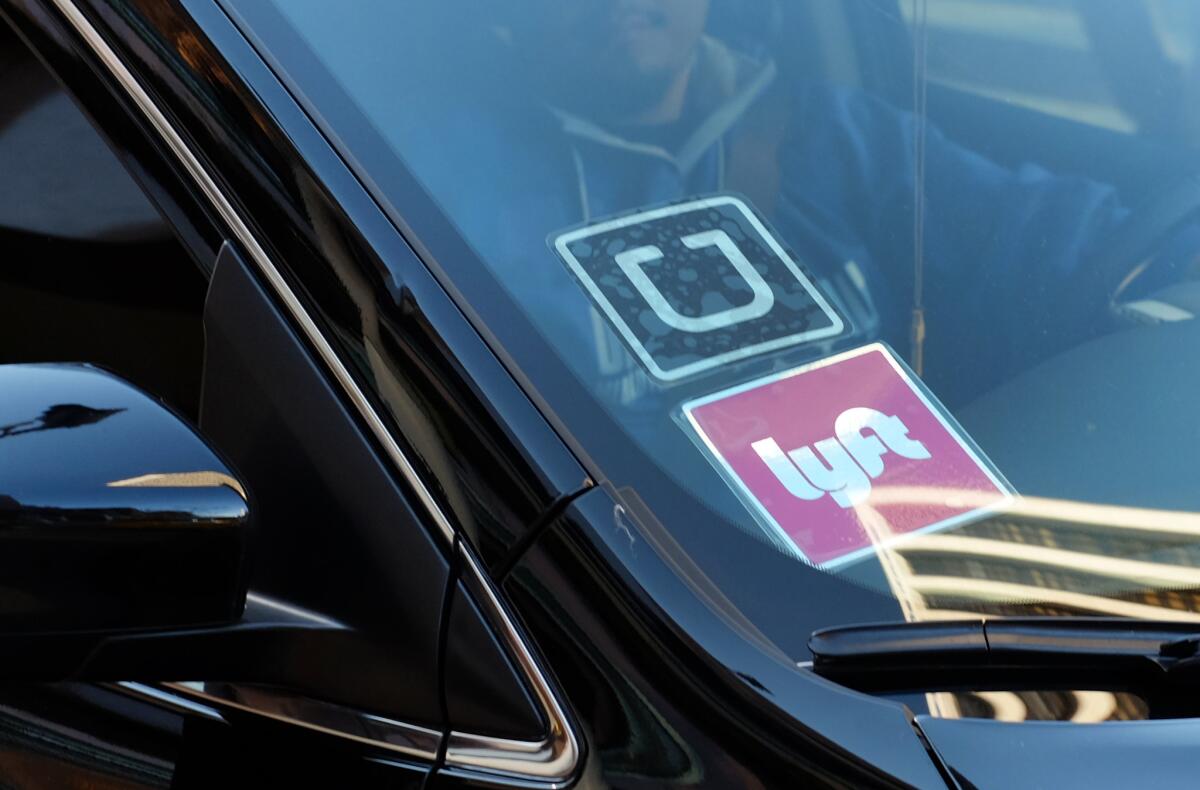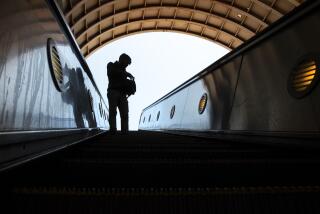Garcetti pushes fingerprint-based background checks for Uber and Lyft drivers

A driver displays Lyft and Uber stickers on his front windshield at Los Angeles International Airport. City lawmakers are now recommending that drivers for the companies undergo a fingerprint-based background check.
- Share via
Drivers for Uber, Lyft and limousine services in Los Angeles should undergo fingerprint scans and background checks similar to those imposed on local taxi drivers, Mayor Eric Garcetti and two city lawmakers told California regulators this week.
The recommendation was included in a letter to the California Public Utilities Commission, which is weighing whether to impose stricter rules on the popular app-based ride services.
The letter — signed by Garcetti, Los Angeles City Councilman Paul Krekorian and council President Herb Wesson — will probably resurrect a multi-year debate over the Silicon Valley transportation companies’ driver screening practices.
Uber and Lyft do not use fingerprint-based background checks, which are often considered the gold standard for screenings because they can identify applicants who use an alias or lie about their criminal records.
By contrast, the Los Angeles Department of Transportation runs the prints of potential taxi drivers through federal criminal databases. Applications from drivers with certain convictions or charges are flagged and sent to city officials for review.
The “opaque nature” of how Uber, Lyft and town-car companies screen their drivers “is a cause for concern,” the lawmakers wrote in the letter.
With the utilities commission’s approval, Los Angeles would start a pilot program that would ban non-fingerprinted Uber and Lyft drivers from working within the city limits, according to the letter.
Officials also would require Uber and Lyft to share data on which applicants have been rejected, and whether current drivers would have been approved to drive under a fingerprint-based system, Krekorian said in an interview.
To do that, L.A. would need state regulators to approve the program, and require that Uber and Lyft participate.
The pilot program would enable Los Angeles to gather “sufficient data to make smart policy decisions” on what screening requirements should be adopted locally, and statewide, Krekorian said.
The companies, the letter said, “would be required to reveal their criteria, patterns and practices for denying drivers employment, driver appellate processes and their pre- and post-fingerprinting rates of acceptance and rejection for new drivers.”
In an email, Uber spokesman Michael Amodeo didn’t address Garcetti’s recommendation, but said the company’s background check process “stacks up well against the alternatives.”
All Lyft drivers go through “a comprehensive screening process,” including a background check and an “in-person session where their credentials are confirmed,” spokeswoman Chelsea Wilson said.
Elected officials and taxi company representatives have pushed back, saying the processes can miss key criminal databases or rely on others that are incomplete.
San Francisco Dist. Atty. George Gascón has called Uber’s verification process “completely worthless” because applicants aren’t fingerprinted.
Last year, The Times reported that four Uber drivers ticketed by airport police had criminal histories that would have barred them from becoming city taxi drivers.
Last year, the top prosecutors for Los Angeles and San Francisco identified 25 Uber drivers with convictions for murder, assault, driving under the influence and other offenses. That information emerged as part of a lawsuit filed by the cities that alleges Uber misled consumers over background checks.
For more transportation news, follow @laura_nelson on Twitter.
More to Read
Sign up for Essential California
The most important California stories and recommendations in your inbox every morning.
You may occasionally receive promotional content from the Los Angeles Times.











